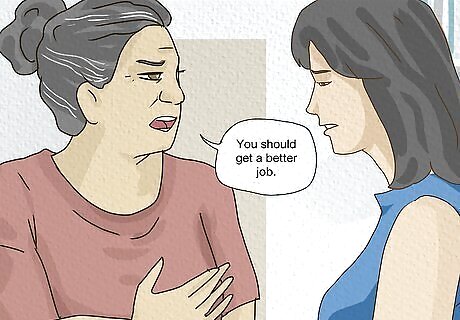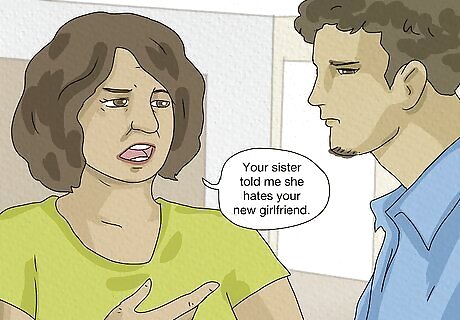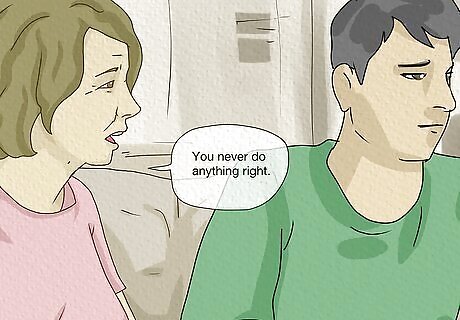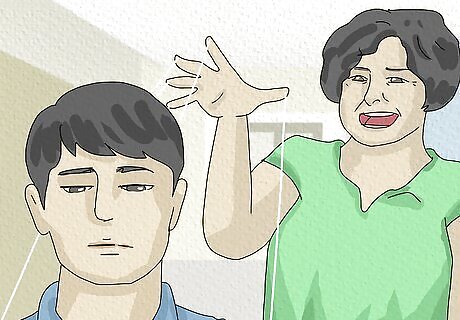
views
- Narcissistic mothers will often criticize you to make you feel bad and rely on them more.
- Some narcissistic mothers may also stir up drama with emotionally-charged statements to make you feel bad.
- Many narcissists will use gaslighting phrases to make you doubt your own reality or downplay their own behavior.
What Narcissistic Mothers Say

She criticizes you. Many narcissists criticize their loved ones to create a sense of unease and dependence. If your mom is a narcissist, she may criticize you often, even about trivial things that don’t matter (like what you’re wearing). She does this to diminish your accomplishments and bring the focus back onto her. Watch out for phrases like: “I don’t like that new guy you’re dating. Why don’t you find someone better?” “You’d better study hard. I know how awful you are at math.” “None of your friends actually like you.” “You should get a better job.” “I don’t know how your spouse puts up with you.” “You’re really going to eat all of that?” “That new dress does not flatter you. You should return it.” “The dinner you made was way too salty.” “Your new house is nice, but the paint job is awful.” “Having a bad hair day?”

She gaslights you. Gaslighting is a tactic used to make you doubt your own reality. Narcissistic parents will often gaslight their children to make them think that their needs don’t matter. It’s because, to a narcissist, their own wants and needs are the only ones in the world—if they can convince you that your own aren’t valid, they won’t have to expend effort or energy on you anymore. Examples of gaslighting include: “I never said that.” “Why are you so upset? You’re overreacting.” “You’re just too sensitive.” “You must have misunderstood me.” “I’d remember if something like that happened.” “Why are you causing drama?” “You really think I would do something like that?” “That’s not what I meant.” “It’s not that big of a deal.” “You’re crazy.”

She’s jealous of you. Narcissists don’t like seeing other people in the spotlight, and they become jealous of their own children. You might notice that as you become more independent, your mother starts accusing you of leaving her behind or replacing her. She may say things like: “You spend all your time with your partner.” “You never come to visit me anymore. You’re always with your kids.” “Why are you hanging out with your friends every weekend? You should be spending time with me.” “I’m the one who raised you, and you’re just going to abandon me?” “How dare your spouse steal you away from me?”

She creates a lot of drama. Have you ever noticed that there is always drama surrounding your mother? Narcissists thrive off of attention, and creating drama is a great way to keep all eyes on them. Your mother might turn simple things into dramatic situations with phrases like: “I bought a new dress and you didn’t even notice. You hate me!” “It was my birthday last week, and you didn’t even send me a gift.” “I was so sick last year, and no one visited me. I could have died.” “No one cares about me. I guess I’ll just go be alone now.” “Your sister told me she hates your new boyfriend.” “You won’t even let a grandmother see her own grandchildren?” “I drove all this way, and you’re kicking me out for nothing.”

She guilt-trips you. Narcissists may try to blame you for their problems or their feelings. If your mother is a narcissist, she may try to make you feel bad for something that isn’t (and can’t be) your fault. She may say things like: “You’ll be sorry when I’m gone.” “I would have had a great career if it weren’t for you.” “I’m so lonely, and you never come visit me.” “I could have been rich if I didn’t have to take care of you kids.” “It’s your fault your father and I got a divorce.” “You’re the reason we lost the house when you were little.” “I’m so sick all the time, probably from all the stress you cause me.” “You won’t help me pay my mortgage? You’re going to let your own mother become homeless?”

She insults your character. When you have narcissistic parents, they often say things that cut deep. More than just criticisms, personal insults are another way to control you and make you dependent on them. If you never have the confidence to make your own way in the world and blaze your own path, then a narcissist gets to keep you in their life forever. Phrases a narcissist might use to lower your self-esteem include: “No one will ever love you.” “I wish you had never been born.” “You don’t have any friends.” “Your siblings don’t even like you.” “The whole family calls you an embarrassment.” “You’ll never find someone who loves you.” “You’ll never make it in the real world.” “Don’t bother going to college; you’re not good enough.” “You’ll be living with me forever.” “You never do anything right.”
Traits of a Narcissist

Grandiose self-importance Narcissists tend to think of themselves as the most important person in the room (if not the world). They think they are above any and all rules, and they believe that they are smarter and more talented than anyone they know. For instance, your mom might try correcting you about engineering topics, even though you’ve been working as an engineer for 10 years while she doesn’t know much about it at all. Or, maybe she shows up to stores 5 minutes after they close, then complains that they wouldn’t stay open for her.

Sense of entitlement Many narcissists feel like they deserve the love, attention, and respect of others without doing much of anything. Similarly, they often feel entitled to ask for favors from others without doing anything in return. Your mother might complain the whole time if you ask her for a ride, but she’ll expect you to drive 2 hours out of your way for her just because you’re her child.

Lack of empathy To a narcissist, their feelings are the only ones that matter. If there’s a narcissist in your life, you might notice that they lack the ability to put themselves in your shoes. This is a very good way to identify narcissism and an indication that your mother might have narcissistic personality disorder. Let’s say you tell your mother that something she said made you feel bad. She’ll likely brush you off because she doesn’t have the ability to see things from your perspective and recognize just how badly she hurt you.

Controlling behavior Narcissists love to be in control of everything in their lives, including the people around them. You might notice that your mother wants to make decisions for you and dictate how your life pans out, even after you become an adult. For instance, she might tell you which college to go to or describe the kind of partner she wants you to marry.

Lack of accountability Narcissists almost never take accountability or show remorse for their actions. If you tell a narcissist that they hurt you, they probably won’t apologize or vow to change. Instead, they will spin it around and blame anyone else for what they did. For example, maybe you tell your mom that when she didn’t call on your birthday, that hurt your feelings. Instead of saying she’s sorry, she’ll come up with tons of excuses (about her health, her broken phone, her busy schedule, etc), before eventually complaining that you never reminded her to.

Manipulation Narcissists often manipulate the people in their lives to get what they want. They don’t care about using people for their own gain, because they lack the empathy to understand what other people are going through. Your mother may manipulate you into doing favors for her or giving her attention. Let’s say your mother asks you for money, but you tell her you have a tight budget. She may use emotional manipulation by crying and saying that you hate her until you eventually give in.
What to Do If Your Mother Is a Narcissist

Set boundaries for yourself. Setting boundaries with a narcissist is the best way to protect your peace. Be clear, and firm, and set consequences for what happens if your mother violates these boundaries. She will probably push back, and it may be uncomfortable, but don’t let your mother cross your boundaries anymore. To limit how often she stops by: “Hey Mom, you know I love visiting with you, but can you call me before you come over? I’d hate to have to turn you away because we’re busy.” To stop her from bringing up topics of conversation: “I’m not comfortable talking about that with you. Can we talk about something else? If you keep bringing it up, I’m going to head home.”

Validate her feelings. At their core, narcissists just want to be heard and understood. Your mother may be hard to deal with, but do your best to empathize with her and let her know that what she’s feeling is valid. “I know you’re upset about the restaurant not letting you in so close to closing time. It’s frustrating when you can’t have the dinner that you wanted to have.” “I understand you feel bad because we can’t come to visit you this weekend. I know it must be disappointing to hear.”

Try not to internalize her bad behavior. Remind yourself that your mother’s behavior has nothing to do with you and everything to do with her. The more you can separate yourself from her behavior, the less it will affect you in the long run. It’s tough to separate yourself from your mother’s behavior after years of being around it. Try repeating a mantra to yourself like, “My mother’s behavior doesn’t define me.”

Visit a mental health professional. Being the child of a narcissist is tough, and it’s even harder if you want to maintain a healthy relationship with them. Visit a therapist or counselor to talk about your mother and how you can set healthy boundaries with her. Your therapist can also help you come up with coping mechanisms to use when your mother’s behavior gets too stressful. Don’t have time to visit a therapist in person? Check out online resources like Better Help.
Can narcissists ever change?

Narcissists can improve their behavior with help from a professional. Like most personality disorders, narcissistic personality disorder can be mitigated with coping mechanisms and behavioral therapy. If your mother ever wanted to change, she could visit a mental health professional and work on learning empathy and compassion. However, your mother needs to make that change for herself. It can be hard to convince someone with narcissistic tendencies that they need to change. Unfortunately, you may need to wait for your mother to realize that her behavior is damaging before she seeks help.

















Comments
0 comment